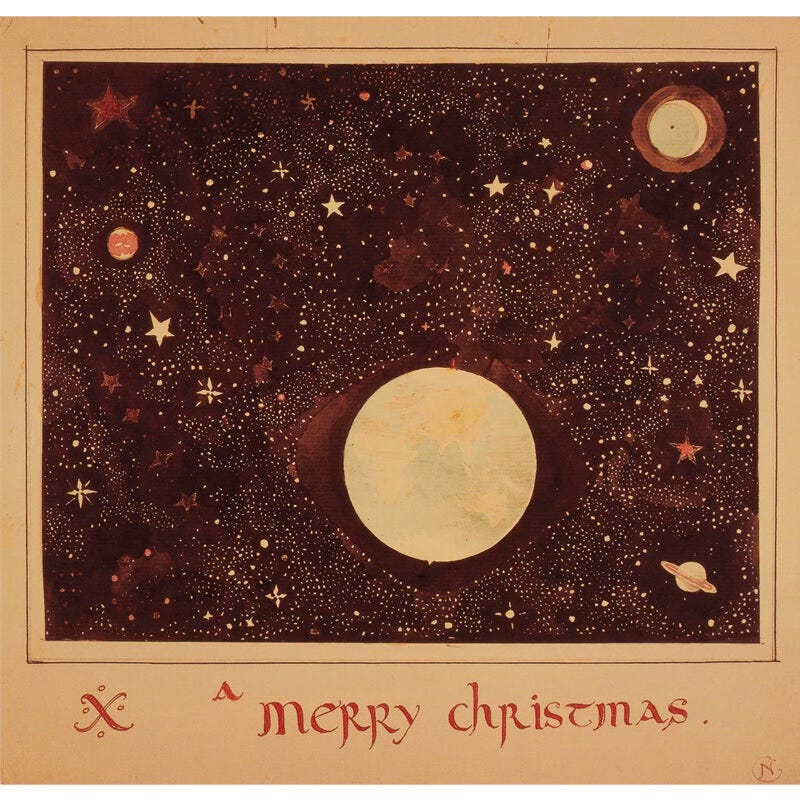Life can feel so busy and cluttered these days that it’s easy to get stuck in a kind of tunnel vision and lose sight of the bigger picture. We power on from task to task and keep our focus narrow and restricted because that’s the way to get things done. But what we gain in efficiency we lose in wide-angle perception. With Christianity playing a reduced role in public life, it’s hard for us to make contact with anything that points beyond our daily contingencies. We become weary and depleted, often without consciously realising it, so we double down on what already isn’t working, trapped as we are in a materialist paradigm which insists on plugging holes with ceaseless stuff and activity to subdue the internal unease. Meanwhile our personal meaning crises grow and mestastasise with the potential to suck us into depression or substance abuse and a complete passivity and loss of agency.
Ainunindalë - the opening of J.R.R. Tolkien’s The Silmarillion - is a terrific antidote to this. It leads us out of our smallness and up into the perspective of eternity, presenting a cosmic vision of creation which, for all its grandeur, does not leave us feeling lost in a vast abyss of galaxies and nebulae, but rather as observers and participants in a dramatic, unfolding story.
In the beginning, before the dawn of time, God (Ilúvatar) creates the Ainur - the Holy Ones - and teaches them to sing, proposing a theme of power and magnificence which they respond to in unison:
Then the voices of the Ainur, like unto harps and lutes, and pipes and trumpets, and viols and organs, and like unto countless choirs singing with words, began to fashion the theme of Ilúvatar to a great music; and a sound arose of endless interchanging melodies woven in harmony that passed beyond hearing into the depths and into the heights, and the places of the dwelling of Ilúvatar were filled to overflowing, and the music and the echo of the music went out into the Void, and it was not void.
But Melkor, the most gifted of the Ainur, chooses to introduce themes of his own, wanting to be his own composer and creator. The music loses its impetus and Ilúvatar proposes a second theme which is once more marred by Melkor’s individualism. Some of the Ainur join in with him while others lose heart and subside into silence.
Ilúvatar declares a third theme, which Melkor once more attempts to subvert:
… a third theme grew amid the confusion, and it was unlike the others. For it seemed at first soft and sweet, a mere rippling of gentle sounds in delicate melodies; but it could not be quenched, and it took to itself power and profundity. And it seemed at last that there were two musics progressing at one time before the seat of Ilúvatar, and they were utterly at variance. The one was deep and wide and beautiful, but slow and blended with an immeasurable sorrow, from which its beauty chiefly came. The other had now achieved a unity of its own; but it was loud, and vain, and endlessly repeated; and it had little harmony, but rather a clamorous unison as of many trumpets braying upon a few notes. And it essayed to drown the other music by the violence of its voice, but it seemed that its most triumphant notes were taken by the other and woven into its own solemn pattern.
Melkor’s braying, strident notes, for all their noise and bombast, serve only to usher in subtle and refined themes of goodness which cannot be undermined by one-dimensional shouting. Melkor will learn to become more subtle himself in time, but there is a lesson for us here in learning to trust the deeper pattern and purpose behind things that we cannot always perceive, especially when our minds and hearts are weighed down by the evil and obtuseness of the world.
Ilúvatar then shows the Ainur what their singing has made manifest. Music becomes Vision. The cosmos is progressively becoming more tangible and real:
But when they were come into the Void, Ilúvatar said to them: 'Behold your Music!' And he showed to them a vision, giving to them sight where before was only hearing; and they saw a new World made visible before them, and it was globed amid the Void, and it was sustained therein, but was not of it. And as they looked and wondered this World began to unfold its history, and it seemed to them that it lived and grew.
The Ainur are enraptured, but the vision fades before the history is complete and they grow despondent. Ilúvatar’s response is to raise the ontological stakes one notch higher. What was originally music has become vision and now He transforms both music and vision into something solid, actual and alive. The physical world is created and in a reverse type of Platonism it is more true and substantial than the music and the vision that preceded it. Yet it could not have come into being without either and remains profoundly related to both, for these are the prototypes - the original templates, if you like - of the world as originally conceived in the mind of God:
Then there was unrest among the Ainur; but Ilúvatar called to them, and said: 'I know the desire of your minds that what ye have seen should verily be, not only in your thought, but even as ye yourselves are, and yet other. Therefore I say: Eä! Let these things Be! And I will send forth into the Void the Flame Imperishable, and it shall be at the heart of the World, and the World shall Be; and those of you that will may go down into it. And suddenly the Ainur saw afar off a light, as it were a cloud with a living heart of flame; and they knew that this was no vision only, but that Ilúvatar had made a new thing: Eä, the World that Is.
Our problem today is that we have lost sight of this vision of our planet shining like a jewelled orb in the depths of space. We have also lost the ability to hear the music of the spheres that called and still calls the world and ourselves into being. Former ages were unlike ours in this respect. The builders of the Medieval cathedrals, for instance, knew this music well and made it the basis of their constructions. But we have become inured to it, and it is this loss of the sacred that is the root cause of all our discontent, unhappiness and disease.
We need to recover it as a matter of spiritual, intellectual, emotional and physical urgency because Ilúvatar’s third theme, which Melkor can neither comprehend nor overcome, pertains directly to ourselves - the ‘Children of Ilúvatar.’ The vision dissolves before our destiny is shown to the Ainur, so the ultimate meaning and purpose of our lives is hidden even from the gods and is known only to Ilúvatar.
We are special in His eyes, and this is bitter gall to Melkor, who cannot accept that such middling creatures are more essential than himself - once the brightest and most glittering of angels - in God’s secret plans. He hates us for this and does everything in his power to stop us from becoming the men and women Ilúvatar created us to be. The world of late modernity is largely of Melkor’s making - a chaos of glass, steel, screens and non-stop chatter that blocks our ears and clouds our eyes so that we can neither hear the music nor see the vision that together give our lives reality and significance.
We need to fight back and reconnect, but not in the way that Melkor would recommend - through force of will and ‘five year plans’ and doing, doing, doing. What we need instead is peace and silence, an inner place of stillness where deep listening and deep contemplation can begin. Then, in time and by the grace of God, we will be able to see again and hear again and tune back in to who we are. And the end will be greater than the beginning. Melkor is afraid of this, but as when the third theme was first sung in the Halls of Heaven, there is ultimately nothing he can do to about it. The will of Ilúvatar reigns supreme:
Never since have the Ainur made any music like to this music, though it has been said that a greater still shall be made before Ilúvatar by the choirs of the Ainur and the Children of Ilúvatar after the end of days. Then the themes of Ilúvatar shall be played aright, and take Being in the moment of their utterance, for all shall then understand fully his intent in their part, and each shall know the comprehension of each, and Ilúvatar shall give to their thoughts the secret fire, being well pleased.
ANNOUNCEMENT: Starting early next year I will be offering personalised bibliotherapy, book recommendations and coaching through the prism of story, myth and verse. This will be via Zoom sessions or email (or face to face in South Australia), so it doesn’t matter where in the world you are based. If you’re interested I’m currently taking names, so please feel free to drop me a line to indicate your interest or for further information.
You can contact me here on Substack, or on X (@Taliessin70) or via email at johnpfitzgerald@proton.me
A very happy and blessed Christmastide and 2025 to you all,
John.






